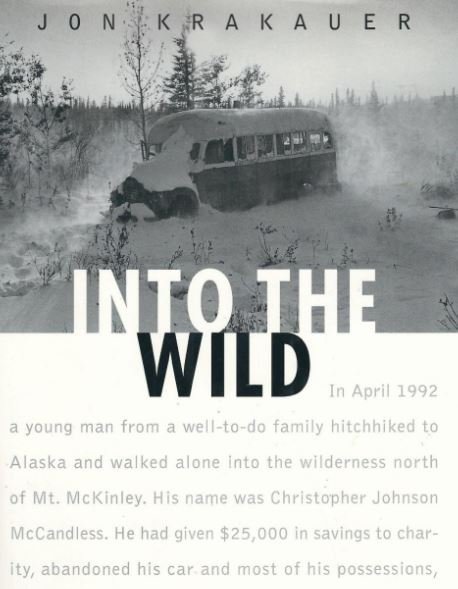
I was flying back from Mexico and the plane was delayed a few hours. By the time I landed in San Francisco I had finished the entire book “Into the Wild” by Jon Krakauer. This “coming of age” book traces the journeys of Chris McCandless and others including the author. They are all gripping tales and the book is extremely well written. Of course the main story is about Chris McCandless and his American odyssey, hitchin, hopping trains and floating around the west that he undertook after graduating from college. Every so often a character like McCandless comes along, influences people in very positive ways, travels far and wide and then dies tragically. At this point they enter the public conscience and become a sort of symbol for approaches to life, spiritual values, materialism and the meaning of existence. Of course, how this enters into the public dialog is often just as much about the art that then is created around the person.
Jon Krakuer’s book “Into the Wild” captures the spirit of the topic extremely well. It is seemingly well researched and the inclusion of chapters about various other young explorers and free thinkers, including Karkuer, make it even more profound. One sees the yearning of McCandlesss as not a freak sort of occurrence but as something that is universal and timeless. People have often left civilization behind, with a head full of ideals to live an acetic life enjoying only the simple pleasures. It has an appeal to most everyone on some level. Krakauer intersperses quotes of various transcendental writers, Thoreau, Stegner, Muir, Tolstoy among others that McCandless was reading that influenced his thinking during the trip. These quotes begin the chapters and give the book a sort of depth and gravity.
On the other hand, the movie “Into the Wild” directed by Sean Penn is but an admirable attempt to take on the subject. The casting is brilliant; the cinematography is spot on, the dialog adequate. Where it falters is that it tries to be too much like the book. For example, quotes of the same transcendental writers flash across the screen but this never has the effect as it does in print. Irritatingly, some of the quotes do not even credit sources. Furthermore, the sound track is a scrapbook with bits from a Canadian film score guitarist, pedestrian tunes from Pearl Jam and generally a lot of music that does not add to the film. The American West is about open spaces and great silence. The movie could have used this sparseness. Instead, it feels a bit like we are on a high school field trip bus and it is noisy and rushed. To be fair, the one piece I liked was some transition music by Kiki King. Do not get me wrong, I enjoyed the movie immensely, it is just that taken as a whole the book, as often is the case, is better.
So if you have already seen the movie, try to forget what you saw and read the book. If you have read the book, read it again. By the end you may want to figure out where your old backpack is in the dusty basement.

